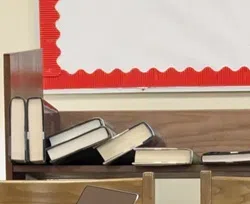(Des Moines Iowa Republican lawmakers gave initial approval Monday to a bill that would remove legal exemptions in obscenity laws for public libraries and schools.
House File 274 would repeal the Iowa Code section that exempts educational institutions and libraries from obscenity laws. Rep. Helena Hayes, R-New Sharon, said it was likely the shortest bill to be debated this year — but the length did not stop the bill from having an “enormous” impact.
The bill was a contentious topic for many of the attendees at the subcommittee meeting. One attendee slammed a stack of books onto the table during another speaker’s comments, and Hayes called for “decorum” to be maintained during the process several times.
The code section in question defines obscene materials as material describing or depicting genitals, sexual activity, sex acts, masturbation, excretory functions or sadomasochistic abuse which “taken as a whole, lacks serious literary, scientific, political or artistic value” and sets punishment for the distribution or exhibition of obscene materials to minors, and the permitting of minors on premises where these materials are exhibited.
The law currently includes an exemption for public libraries and educational institutions, stating “nothing in this chapter prohibits the use of appropriate material for educational purposes in any accredited school, or any public library, or in any educational program in which the minor is participating,” and that obscenity laws do not prevent minors from attending an exhibition or using any materials at public libraries.
Several supporters of the bill said the measure was necessary because of material in libraries available for minors that contain sexually explicit content, or that focus on LGBTQ identities and experiences. Evelyn Nikkel with the PELLA PAC, a Pella-based group lobbying in support of measures targeting “propaganda promoted by Marxist and atheist bureaucracies” according to their website, said librarians and library boards have exhibited a “total disregard” of Iowa’s obscenity laws to “make sure that they keep this filth continually in front of our children.”
The Pella Public Library was the subject of discussion in 2022 when some parents led an effort to remove the book “Gender Queer” by Maia Kobabe from the public library’s shelves. The library reviewed the book and decided to keep it available on shelves in the adult section.
Nikkel criticized the Iowa Library Association for adhering to standards set by the American Library Association, which she said was a “Marxist godless group, hell bent on flooding our minors with sexually explicit graphic novels, violent R-rated streaming videos, adult audio books and LGBTQ+ deviant sexual behaviors.”
“Businesses can’t merchandise this smut, but our taxpayer-funded public libraries intersperse it on their shelves to ambush children as young as five years old, especially targeting young people,” she said.
Keenan Crow with One Iowa, an LGBTQ advocacy group, said that proposal was concerning, especially when considering other bills being discussed this session. One example is Senate File 116, a bill that would make it a crime to expose a minor to an “obscene performance” and allow parents and guardians to bring lawsuits against people who “knowingly disseminated or exhibited obscene material” to a minor.
This combination of bills could lead to a barrage of “strategic lawsuits against public participation,” known as SLAPP, against libraries, Crow said, that would not be expected to succeed in court but intended to intimidate libraries into removing challenged material to avoid a long, expensive court battle.
“There are no other states that currently have this combination of laws, and I will also note that 44 other states currently have the exemption that this bill is seeking to remove,” Crow said. “The reason is that these frivolous lawsuits will happen at taxpayer expense for no other reason than to intimidate librarians and educators. Strong laws about obscenity are necessary and important in our society, and they do a great job of both protecting access to reading and removing truly objectionable, meritless material — most of these laws have been in place and are working well since the Kennedy and Reagan years.”
Crow said libraries are not currently displaying or making available “obscene material,” as defined by the legal Miller test, that requires material be found to lack “serious literary, artistic, political, or scientific value” to be deemed obscene.
Rep. Heather Matson, D-Ankeny, linked the bill to initial book banning efforts in Germany during the rise of Nazism, citing an article by Dr. James McSpadden discussing Nazi’s policies not of destroying all copies of banned books, but removing them from open shelves, available to the public, to restricted libraries.
While some advocates supporting the bill said removing these materials from libraries would not be banning these books, as they would still be available for purchase, Matson argued that parents can exercise control over whether they bring their children to the public library if they are concerned about their access to certain books.
“If you want to hover over your children in a public library, please be my guest,” Matson said. “But libraries are voluntary inquiry. I cannot tell you how many times I said that in the last two years, and apparently I don’t have to be done with it — Libraries are voluntary inquiry.”
Hayes said the discussion on the measure would continue, signing off on it with Rep. Samantha Fett, R-Carlisle, moving it to consideration by the House Education Committee. She said she disagreed with calling the bill a “book ban,” linking it to criticisms of the 2023 Iowa law requiring the most books with descriptions or depictions of a sex act be removed from public school libraries.
“I certainly don’t think it’s a book ban,” Hayes said. “I know that’s an easy out, and anybody who wants to do anything about age-appropriateness or talking about books or having any — setting any boundaries whatsoever, is automatically seen to be a book ban.”













